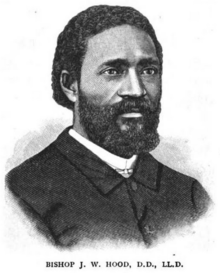James Walker Hood
| James Walker Hood | |
|---|---|

Sketch of Hood from 1895.
|
|
| Born |
May 30, 1831 Kennett Township, Chester County, Pennsylvania |
| Died | October 30, 1918 (aged 87) Fayetteville, North Carolina |
| Nationality | American |
| Occupation | Minister |
| Political party | Republican |
| Religion | African Methodist Episcopal Zion Church |
James Walker Hood (May 30, 1831 – October 30, 1918) was an African Methodist Episcopal Zion (AME Zion) bishop in North Carolina from 1872 to 1916. Before emancipation, he was an active abolitionist, and during the American Civil War he went to New Bern, North Carolina where he preached for the church to the black people and soldiers in the area. He was very successful and became an important religious and political leader in North Carolina, becoming "one of the most significant and crucial African American religious and race leaders during the nineteenth and early twentieth centuries". By 1887 he had founded over six hundred churches in Virginia, North Carolina, and South Carolina and erected about five hundred church buildings. He was politically and religiously active as well, supporting education, civil rights, and the ordination of women.
James Walker Hood was born in Kennett township, Chester County, Pennsylvania on May 30, 1831 to Harriet and Levi Hood and had eleven siblings. Hood fought for his right to ride public transport from boyhood. Between 1848 and 1863, he noted that conductors on the Pennsylvania railroads many times tried to remove him from the first class cars, but rarely succeeded. He also actively spoke against slavery. Hood was first licensed to preach around 1852, and in 1855, Hood moved to New York City and in 1856 was licensed to preach in a branch of the Union Church of Africans in the city.
In 1860 he was ordained deacon in the AME Zion church and sent to the Nova Scotia mission in Halifax. In 1863 he was stationed at Bridgeport, Connecticut, and after six months was appointed missionary by Bishop J. J. Clinton sent to North Carolina to replace another missionary, John Williams, who was not prompt enough in travelling south due to safety issues. Hood arrived in Washington, DC by January 1, 1864, and reached New Bern on January 20.
Clinton's sending of missionaries to North Carolina was at the general invitation to churches for missionaries to his department by General Butler who was in charge of the area at that point in the US Civil War (1861–1865). Black troop stationed at New Bern at that time did not have a chaplain, and Hood often preached to the troops. His position was informal and he never held a commission, but he was called "chaplain". Hood was present for attacks on New Bern by Confederate troops before the war ended although not under direct fire. In New Bern, Hood preached at the Andrews Chapel and largely succeeded to make his church the primary church of blacks in the area.
...
Wikipedia
